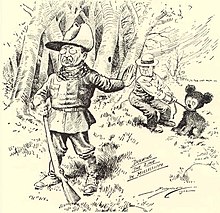| Theodore Roosevelt |
The assassination of William McKinley in 1901 catapulted vice-president Theodore Roosevelt into the presidency. Although Van Roosevelt is an old Dutch family name that means from the field of roses, Teddy Roosevelt's seven years as president were no bed of roses (I think that phrase must refer to a bed of rose petals - a bed of made from rose plants would be worse than a bed of nails)!
One name often associated with Roosevelt is Rough Riders. This term was not coined by or for Roosevelt himself. It had been used for more than 100 year to mean a bronco buster, but was appropriate to the group of cavalry assembled from cowboys and other outdoorsmen who could ride and shoot for the U.S. Army in the Spanish-American War of 1898.
 |
| A 1902 political cartoon in The Washington Post spawned the teddy bear name. |
Another phrase attributed to Roosevelt is "weasel words". The term probably didn't originate with him, but he certainly used the phrase a lot. It means words that weaken the effectiveness of another word or expression. Roosevelt used the expression in a 1916 speech urging action by the Wilson administration toward Germany for their seizures of American merchant ships. He said that the rhetoric from the State Department was filled with weasel words. "When a weasel sucks eggs the meat is sucked out of the egg. If you use a 'weasel word' after another there is nothing left of the other." The idea of a weasel sucking eggs appears in Shakespeare's Henry V (" The weasel Scot comes sneaking and so sucks the princely egg.") and As You Like It ("I can suck melancholy out of a song as a weasel sucks eggs.") Weasels probably do eat birds' eggs but they probably don't suck them out, rather bite a hole and lick them out.
Although use of weasel words is a specialty of politicians we have all probably tried to weasel out of something. This expression is related to the weasel's phenomenal ability to escape from tight places. Those of you who have owned the weasel's cousin, a ferret, as a pet have probably experienced this. The weasel has a slim, muscular body and narrow, elongated skull. That and its tenacity and fierce temper make such exits possible.
Weasels and other predators are often assigned dubious characteristics by humans. Humans, the most predatory of all, like to call other predators evil. We need to realize evil has to do with intent, not dinner. In earlier times a deceptive young woman was called a weasel and a weasel symbolized supernatural evil (sharing that symbolism with black cats).
Two species of weasel are found in Colorado. Both the long-tailed weasel and its smaller, less-common cousin the short-tailed weasel turn from brown in the summer to white in the winter except for a black-tipped tail. Hawks and owls (major predators of weasels) are sometimes fooled into striking at the bobbing black tail instead of the body.
The word "weasel" is probably related to the Sanskrit word "visra" which means musty-smelling. Weasels are members of the family Mustelidae. The whole family is pretty smelly, especially skunks. The origin of the word mustela which is Latin for weasel is probably mus (mouse, not a word for smelly), and means it catches mice, which it does. The word weasel can be traced from the Old English wesole or wesole through the Middle English wesele to our weasel.
All around the cobbler's bench
The monkey chased the weasel.
The monkey thought it all in fun.
Pop goes the weasel!
Many variations of this nursery rhyme exist with the only constant being "Pop goes the weasel". Likewise there are many explanations for the origin of this rhyme. I have two favorites for the weasel involved. One concerns a spinner's weasel. It is a large spoked wheel on which yarn is wound after spinning. After 80 yards has been wound the wooden gears inside make a popping sound so the spinner knows it is time to cut off the yarn and tie it into a skein. The other also concerns the garment industry. An iron formerly used by tailors was called a tailor's weasel that was heated on a wood-burning stove. The tailor would spit on it and listen for a pop which would indicate the temperature was right for ironing. Why were they called weasels? One explanation I read was "weasel" was a corruption of "weevil" (a snouted little bug), but that makes no more sense than weasel! It'll just have to remain a mystery!
The descent of a modern word or phrase from an animal origin is often obscure. It is sometimes unflattering but always should prove interesting. I welcome any questions or suggestions!
I was browsing Facebook and found this joke: A weasel walked into the bar. The bartender looks up and says "Wow! In all my years tending bar I have never served a weasel! What can I get you?"
ReplyDelete"Pop!" goes the weasel!